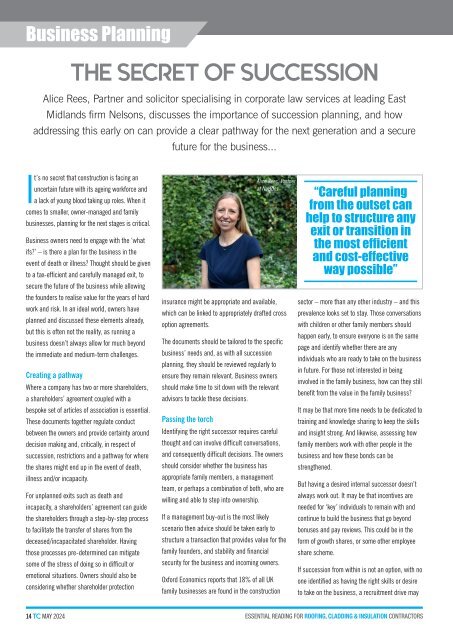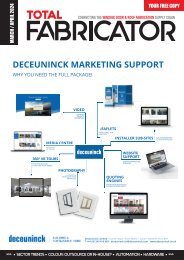May 2024
You also want an ePaper? Increase the reach of your titles
YUMPU automatically turns print PDFs into web optimized ePapers that Google loves.
Business Planning<br />
THE SECRET OF SUCCESSION<br />
Alice Rees, Partner and solicitor specialising in corporate law services at leading East<br />
Midlands firm Nelsons, discusses the importance of succession planning, and how<br />
addressing this early on can provide a clear pathway for the next generation and a secure<br />
future for the business...<br />
It’s no secret that construction is facing an<br />
uncertain future with its ageing workforce and<br />
a lack of young blood taking up roles. When it<br />
comes to smaller, owner-managed and family<br />
businesses, planning for the next stages is critical.<br />
Business owners need to engage with the ‘what<br />
ifs?’ – is there a plan for the business in the<br />
event of death or illness? Thought should be given<br />
to a tax-efficient and carefully managed exit, to<br />
secure the future of the business while allowing<br />
the founders to realise value for the years of hard<br />
work and risk. In an ideal world, owners have<br />
planned and discussed these elements already,<br />
but this is often not the reality, as running a<br />
business doesn’t always allow for much beyond<br />
the immediate and medium-term challenges.<br />
Creating a pathway<br />
Where a company has two or more shareholders,<br />
a shareholders’ agreement coupled with a<br />
bespoke set of articles of association is essential.<br />
These documents together regulate conduct<br />
between the owners and provide certainty around<br />
decision making and, critically, in respect of<br />
succession, restrictions and a pathway for where<br />
the shares might end up in the event of death,<br />
illness and/or incapacity.<br />
For unplanned exits such as death and<br />
incapacity, a shareholders’ agreement can guide<br />
the shareholders through a step-by-step process<br />
to facilitate the transfer of shares from the<br />
deceased/incapacitated shareholder. Having<br />
those processes pre-determined can mitigate<br />
some of the stress of doing so in difficult or<br />
emotional situations. Owners should also be<br />
considering whether shareholder protection<br />
Alice Rees, Partner<br />
at Nelsons<br />
insurance might be appropriate and available,<br />
which can be linked to appropriately drafted cross<br />
option agreements.<br />
The documents should be tailored to the specific<br />
business’ needs and, as with all succession<br />
planning, they should be reviewed regularly to<br />
ensure they remain relevant. Business owners<br />
should make time to sit down with the relevant<br />
advisors to tackle these decisions.<br />
Passing the torch<br />
Identifying the right successor requires careful<br />
thought and can involve difficult conversations,<br />
and consequently difficult decisions. The owners<br />
should consider whether the business has<br />
appropriate family members, a management<br />
team, or perhaps a combination of both, who are<br />
willing and able to step into ownership.<br />
If a management buy-out is the most likely<br />
scenario then advice should be taken early to<br />
structure a transaction that provides value for the<br />
family founders, and stability and financial<br />
security for the business and incoming owners.<br />
Oxford Economics reports that 18% of all UK<br />
family businesses are found in the construction<br />
“Careful planning<br />
from the outset can<br />
help to structure any<br />
exit or transition in<br />
the most efficient<br />
and cost-effective<br />
way possible”<br />
sector – more than any other industry – and this<br />
prevalence looks set to stay. Those conversations<br />
with children or other family members should<br />
happen early, to ensure everyone is on the same<br />
page and identify whether there are any<br />
individuals who are ready to take on the business<br />
in future. For those not interested in being<br />
involved in the family business, how can they still<br />
benefit from the value in the family business?<br />
It may be that more time needs to be dedicated to<br />
training and knowledge sharing to keep the skills<br />
and insight strong. And likewise, assessing how<br />
family members work with other people in the<br />
business and how these bonds can be<br />
strengthened.<br />
But having a desired internal successor doesn’t<br />
always work out. It may be that incentives are<br />
needed for ‘key’ individuals to remain with and<br />
continue to build the business that go beyond<br />
bonuses and pay reviews. This could be in the<br />
form of growth shares, or some other employee<br />
share scheme.<br />
If succession from within is not an option, with no<br />
one identified as having the right skills or desire<br />
to take on the business, a recruitment drive may<br />
14 TC MAY <strong>2024</strong>
















